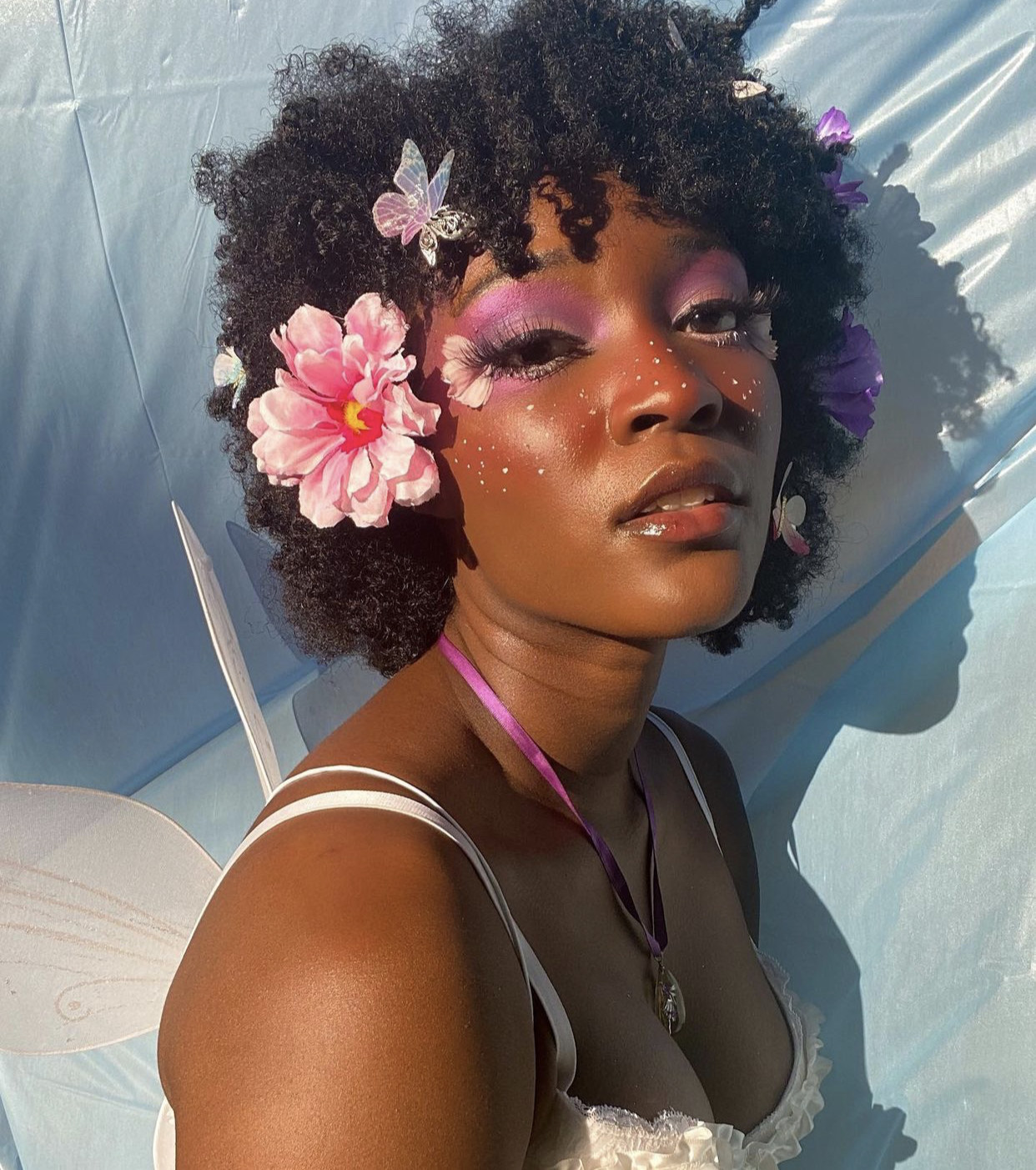At 6’ tall with a statuesque build, Jordan Simone was frequently encouraged to pursue modeling. Her friends convinced her that TikTok would be a great way to gain exposure, so she created an account. One day, she decided to post a video about the seven things she felt the Black community needed to work on. The enthusiastic response blew her away. “I was like, ‘Wait a second. If you want to hear what I have to say about Black people, wait until I have to say things about white people.’ At the time, I was thinking a lot about white allies and white activism. I’m like, ‘Do that, but also y’all do that in a weird way. Here’s some critiques. Here’s gentle critiques that were gentle, but not gentle.’” Her videos became a source of education for users eager to learn about anti-Blackness and how to enhance their allyship. “I just started answering people’s questions or making content around what people were saying. It became its own thing from the things I was already passionate about featuring this need as a society. Society was like, ‘Hey, I actually want to know more about this and you deliver the information in a way that doesn’t make me angry or upset. You’re not yelling at me making me feel like an idiot. There are things I don’t know, but I appreciate that you’re not making me feel bad about not knowing things.'” Despite amassing nearly 300,000 followers, Jordan continues to focus on her contributions to various movements, characteristically conscious of the perpetual drive to grow and improve her own awareness of social issues. “I always called myself an aspiring activist, because I never feel like I’m doing enough. Maybe that’s the imposter syndrome. But ever since I was 16, I have a strong sense of what is right and what is wrong and what personal liberties are versus what the collective needs. And so when life decided (and TikTok decided) that this was something I was good at, I was like, ‘People have questions, and I actually have the answers.’” She extends that same understanding and compassion to her followers. “My mom’s always been a teacher, and as someone who is a teacher and teaches and has always been around teaching, I’m like, ‘I know I can’t judge you for not knowing things. Thank you for just asking and being willing to learn and listen.’ And so that’s made a safe space on my page,”
Unfortunately, TikTok is notorious for having a contentious relationship with Black creators, suppressing their discussions of racism and whiteness – while happily enabling white creators to profit off of content stolen from Black creators. It wasn’t long before Jordan found her own content was being censored. The community is rallying to demand change, planning a Blackout for the first half of May, strategically targeted to deprive the app of content to make a statement about the power Black creators hold. “I know there are a lot of conversations happening about leaving the app for a little while, because it takes a trend two weeks to come in and out of fashion. The two week trend will end-ish sometime in early May. They’ll be looking for something new. We’re not there to give them something new.” There are some simple ways users and creators can show solidarity with Black creators. “You can support Black creators by actually watching our content all the way through, or even most of the way through, engaging with it and making sure that people give credit where credit is due, and hearing us when we speak.” Most crucially, don’t avoid or ignore conversations about racism because they’re difficult. “When Black creators have something to say, listen to it and hold it with value. As opposed to just ‘It makes me uncomfortable, so I’m not going to engage with it.’ We need to be as okay as we can be talking about race and racism. Because if you’re not, all that upholds is the systems of whiteness and white supremacy and TikTok is already trying to push down those videos. You have to be willing to seek them out and engage with them, so TikTok can’t do that. Because at the end of the day, it’s just a computer we’re fighting. But we are losing to a computer and that feels wrong.”
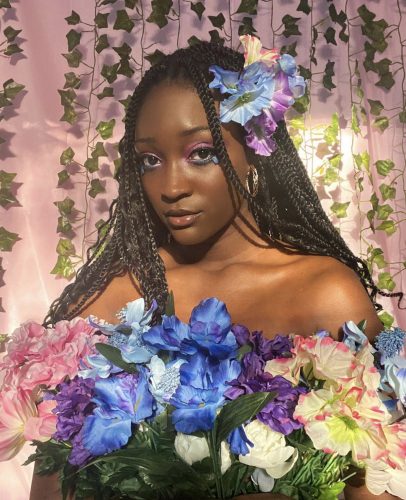
Recently, white creators have found yet more ways to appropriate from the Black community, most egregiously by co-opting Cynthia Erivo’s “Stand Up” (a song about breaking free from slavery) as the soundtrack for the 97% movement, which aims to spotlight the overwhelming proportion of women subjected to sexual harassment. And while the 97% movement is extremely important, so is allowing the music to continue to exist in its original context. “When you’re Black and seeking representation in music or on TikTok or wherever, that impact matters. And so if a Black creator makes a song about Blackness, it’s important to leave that alone,” Jordan says. “Because number one, that was the whole point. I wrote it down so that we can use it for this moment. But number two, is we don’t have a lot of spaces we can go. We don’t have a lot of sounds that represent who we are, and while it feels like it shouldn’t be a big deal because white people don’t have to have that desperate search or that desperate cling to something to feel represented, Black people do.” She urges critique of false calls to unity. “It’s great to say, ‘We’re all people. We’re all equals.’ It’s a great concept. It truly is. It’s something we all should aspire to, but we’re not there yet. And until we get there, these things matter because it’s what we have. And also just listen to the lyrics. Just put your listening ears on and just hear what they’re saying or read it or whatever you need to do. But I think it’s very intentional, both on behalf of the creator and on behalf of the user to be aware of what they’re saying and what their goal was, and also what that impact is. And so if that song speaks to you as somebody who’s not Black, that’s great and that’s cool. But recognize what they intended and move accordingly.” Most often, this insistence on “coming together” is a barely disguised pressure campaign designed to silence Black folks within the very spaces they themselves crafted as safe havens. “The point is, you have other places to go. You don’t need to come into my house. Why are you in it? And more importantly, why are you shoving me out of it in that?” Jordan wonders. The full weight of TikTok’s algorithm is already behind white creators, so the least they can do is be more intentional in their song selection.”TikTok loves white people. The internet loves whiteness. And so all of those things are automatically boosted to the top of the algorithm, to the top of the For You page. All of that is just boosted straight to the top. And so it’s important to know that and be aware that the privileges that you hold mean that ‘If I do this thing, I’m going to be seen, and I’m going to be heard. I need to be aware enough to not interject myself in this space. Does it mean maybe I miss out on a cool sound? Sure. Do I have literally 8 million other songs to listen to or to actively choose? Yes. And so in my awareness of the privileges I hold, I will move accordingly until I don’t have to.’ And if we all have that mindset, we can probably knock out systemic racism in like 20 years. It’s hard, but it’s really not that hard.”
This sense of whiteness as default fortifies resistance to criticism, which Jordan attributes to white people’s misconception of racism as only confined to overt hatred and violence. “Number one, we need to redefine what being racist means. Growing up, we learned racism is the lynchings of the 60s, the KKK (which is still around…what the heck?) And hate crimes. Cool. Important to talk about. Essential to talk about, because all those things are still happening today. But racism does not start and stop there. Racism is a systemic issue built into every industry that we have, because when we built this country in oh dark 30, the foundation was led in a racist way. When this country started as three fifths of a person, that doesn’t end because you changed that one law. The foundations are still there. Our building has rot, and we need to take the rot out. And, when I say, ‘Hey, somebody taught you something racist, and you’re doing it.’ You’re not a bad person. I’m not saying you are the KKK. That’s not what I’m saying. What I’m saying is in this racist system, you learned a racist thing, and you need to unlearn it in the same way that I do.”Jordan has spent years unlearning her own internalized biases, which ran so deep that they impacted (and dictated) perceptions of how she spoke. “We all have racism built into us. I have anti-Blackness built into me. Growing up I spoke in AAVE for 11 minutes. My mom was not having it, but I spoke that way. I had a Southern accent. I still say things like ‘six one way, half a dozen the other.’ And nobody knows what I’m saying, but I was taught that talking like that is ignorant. It makes you ignorant. It makes you dumb. You won’t get a job. I went to speech therapy. I didn’t particularly need it. I just spoke in AAVE. But I went to speech therapy. I had it beat out of me. And now I say things like ‘exponentially’ in casual conversations, which stresses other people out. There’s no balance here. It is what it is. But it took me years to learn that you’re not dumb for speaking in AAVE. That is its own dialect. It has its own rules. There’s a form to this. And even if it wasn’t, you’re still not dumb. But it’s a studied, researched, mini language of its own, and it’s not bad to speak like that. It’s stigmatized. If I have to unlearn that as a Black person, you mean to tell me that as a white person, you didn’t pick up on a shred of racism growing up? You did, because you and I went to the same school. You learned what I learned, and what I learned made me hate me. Which means you in your own way definitely learned something that should make you not like me or have some prejudices or stigma. It is what it is. Stop fighting it.”
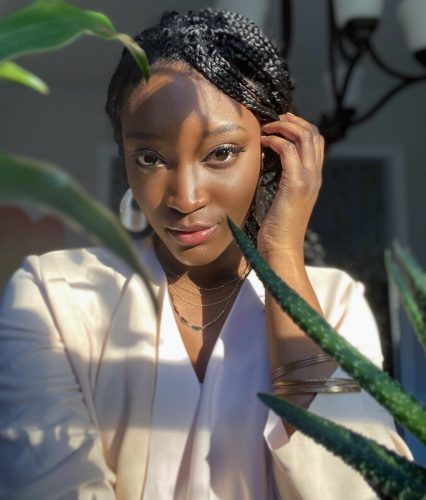
We must re-engineer these conversations to shift understanding of racism as a whole. “If we restructure the conversation around – this is what racism is. It’s not just active hate. Racism is active hate. It is also a system we were all born and brought up in and we all have some unlearning to do. We can have those conversations around…‘Okay, so this is how white people uphold racism. This is what a microaggression looks like. This is all this other stuff.’ Now we can have productive conversations.” Failure to acknowledge the spectrum of racism inevitably leads to acquiescence to white fragility, corroding the vitality of the movement long-term. “I read this article. Some activists and organizers were talking about how they have to be very mindful of what they protest against. They have to be very mindful with what they preach, because white people have briefly started putting themselves on the front lines in terms of protest. If the police show up, white people will make a line with their bodies to make a barrier. Great. If they upset too many white people, they will stop coming to the protests and Black people lose that source of protection. Now organizers are like, ‘We have to be very intentional with what we do in a different way to protect whiteness. Because if we don’t, we lose the help that we have.’ And that’s not a productive way to go about this. Because at the end of the day, we want to undo those systems that mean you need to be on the front lines at all. But I can’t undo those systems if you’re not in this to win this. And that means you also have some learning to do.” The process would be smoother if we could all learn how to soften our defensiveness and be more receptive to criticism. “People don’t like to be told that they’re wrong. People don’t like to be told that they did something racist, because we made racism rightfully, but also in a way, wrongfully, this big, bad, scary thing,” Jordan muses. “It’s like saying you did something racist does not mean you lynched me in the backyard. It means that you called [my natural hair] floofy. I didn’t like being called floofy. Just adapt and learn. It doesn’t have to be the end of the world, if you don’t take it to that place. But that’s where we are taught to take it, because in your defensiveness, I am forced to uphold whiteness. It was a beautifully designed system. But if you don’t check yourself or let me check you, all we’re going to do is uphold the same system. We will simply rebrand everything under a new name for the 15th time and call it a day.”
White women in particular have a penchant for weaponizing their whiteness as a means of dominating discussions around misogyny to cajole Black women into silence when they attempt to talk about the violence they’ve experienced through the lens of race and misogynoir. Jordan herself was harassed by white users into deleting her video discussing her personal connection to the 97%. She recalls: “Other women went viral for the same conversation. But I wasn’t allowed to have it. I wasn’t allowed to be in that space. There was nobody letting me exist here. I’m like, either A, stop crying or B, let us have our own spaces. Black women do have these conversations in our own spaces, in our own ways. But white women always find themselves, ‘Oh, this happened to me too.’ Great. Perfect. Fine. But then it becomes about them. It becomes about their comfort. It becomes about their safety and not at the cost of our own.” This erasure is especially harmful because understanding the intersection of anti-Blackness and misogynistic violence is imperative to fight sexism. The intense focus on white women in the media gave young Jordan an incredibly dangerous false sense of security. “I didn’t think Black girls got kidnapped growing up. I didn’t think it was a thing that happened to us. I was like, white women are desirable. White women are cute. When I looked at the milk carton, it’s a white girl. When I look at the posters, it’s white girls. Black women don’t get kidnapped. I’m safe. And then doggone it, I grew up. And one day I was scrolling through Twitter and they were like, ‘Oh, yeah.’ It was like 60,000 Black women are missing right now. Black girls, Black kids are missing and we’re not talking about it. And…I was like ‘60,000? We get kidnapped?’ And they were like, ‘Yes, we get kidnapped most often.’ But we’re so far pushed out of the conversation that I genuinely thought that was not a thing that happened to us on a regular basis, when it happens to us at a disproportionate rate. By centering all the conversations around whiteness, we create not only an exclusion of Blackness, but a culture of ignorance. I was so dumb, I could’ve gotten kidnapped. And I would’ve been none the wiser.” Black women deserve spaces to speak freely without worrying about tone policing or having to accommodate white women‘s feelings. “We need to make these safe spaces, because if we don’t, people walk around like me. Dumb as a sack of rocks and thinking it can’t happen to you, when it totally can and totally does. I think that to have these conversations, you have to be able to say, ‘This happens to Black women, even though they’re strong, even if you think that they’re all tough, because we’re just humans. Even if you think we’re masculine.’ We’re not, but okay. It happens to us. We need to be a part of these conversations too, in all of the ways that they come in and our input is valuable. And I think either the best place to do that is you either let us talk about it in our own safe spaces with each other, so that we can at least know what’s happening. Or stop silencing us because you didn’t want to talk about it on Monday. If you don’t want to talk about it, that’s cool. That doesn’t mean I can’t talk about it. It means you need to leave, because I need to talk about it today. That’s not to say my comfort trumps your comfort or whatever. But if we’re having a conversation about trauma, and I decided to speak up on it today, you can’t decide I can’t speak up on it because you don’t want to talk about it today. I respect you and your choices, but that means you need to leave. Not, I need to be quiet, and that’s okay. I don’t need you to hear me. I mean I need you to hear me, but if you can’t do it today, as somebody who has experienced trauma, okay, I respect it. Go ahead, but I also need to process my grief and my hurt. And if you can’t be a part of that today, that’s cool. Goodbye. But you can’t tell me not to talk because you don’t want to hear it.”
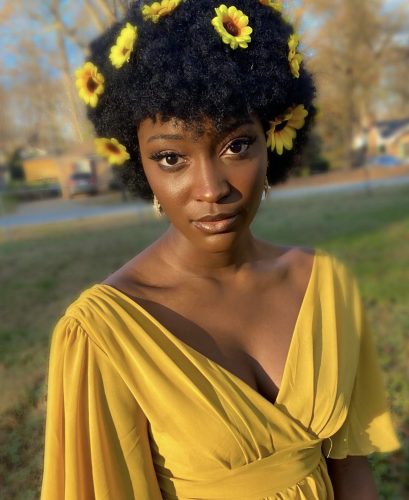
On a broader scale, the process of dismantling white supremacy to rebuild an anti-racist society relies on sweeping change. “I think on a big level, we need to do some big institutional work. And this is the thing that I think will take the most time,” Jordan says. “That’s why when people are like, ‘Do you think if we worked hard enough we could end racism tomorrow?’ I’m like, ‘Absolutely not.’ Our infrastructures will crumble. Everything will fall apart. No, but the work needs to be done. Because things like policing, for example, because that’s on my mind lately. It was built on slave catching. The whole system needs to go. It wasn’t designed to be safe. It just needs to go. We need to replace it with something else. We need to reallocate funds. The whole thing needs to go. We need to try over. That’s going to take time. It’s a big deal. It’s necessary. It’s going to take time. It’s going to take labor. Or politics. Our political systems were created when I was three fifths of a human being. I couldn’t even be the whole human being. The whole thing needs to go. I think it should be replaced with things that are more inclusive. And I don’t just mean laws and acts that need to be replaced every so often. The Voting Rights Act – it’s got, I think two parts of it that are still standing. Everything else has either expired and not been renewed or replaced with something worse. And that’s our pinnacle of success is the Voting Rights Act. And it’s almost dead in its entirety. We can’t replace it with laws. We can’t replace it with acts. We need to replace it on a fundamental structural level. It’s going to be a big job. It’s going to take more than me. Good luck, Charlie.” In addition to redressing institutional racism, we also need to keep that momentum going to tackle everyday racism. “On a micro level, we need to talk about racism in terms of big and little picture. Racism is ‘I hate Black people, yada, yada, yada.’ It’s also, ‘Hey girl, your hair is really floofy.’ It’s the way that we do Black minstrel shows on the internet, where people get super dark tans and long acrylic nails and start wearing bonnets. And girls start talking [in a parody of a blaccent] all the time. And it’s funny to you. It was funny to me in 2008. And then I was like, ‘Oh, that’s how they see me.’ The joke is funny if it’s not harming people, but when it harms people, stop the joke. We need to stop being so uncomfortable because a critique isn’t a criticism on your whole person, it’s a critique of your actions. I had this one substitute teacher who was like, ‘I never hate you. I might hate what you did, but I don’t hate you.’ Same energy, same energy. I’m not judging you. I don’t hate you, but you did a bad thing. I will gently correct it. We can go on with our evening. That’s it.”
Nonetheless, a vocal and disgruntled few have taken issue with Jordan drawing attention to the racist undertones of recent trends like fake tanning and lip injections, accusing her of trying to “cancel everything.” However, it’s crucial to understand the appropriative aspects of these “hobbies,” which have insidious roots in the fetishization of Black bodies. (And a history that many would prefer to ignore, as illustrated by one user’s misguided boast that Europe is supposedly free of racism, prompting Jordan to unfurl a laundry list of evidence to the contrary. “I think I pissed off the continent of Europe as a collective,“ she informed me with a grin.) She is eager to unpack the violence undergirding the popularization of these so-called aesthetics. “I think it’s important to talk about it, because when you don’t, you think that you are doing a good thing or a non-harmful thing, when you are actively perpetuating systems of harmfulness. When you don’t see Black women on TV, when you don’t see Black women in media, but you do see Rebecca with the darkest tan that they offered from a bottle of, I kid you not, the blackest black suntan lotion with lips that she injected super large. Because these are all things that are in trend. Number one, why is my face a trend? You can’t get to pick and choose when you get to participate in my face. But why is my face a trend without me? What is wrong about me and my Blackness that makes me less desirable than someone who went and bought all the aspects of Blackness and then perpetuated them? And that all traces back to Sarah Baartman and the way that her body, when she died, was put on display. Not only did you take a Black woman from her home because she was thicker than a bowl of oatmeal and toted her around Europe for her whole life without her consent and never liberated her, when she died, you took her body and took it on the road. That trauma is still there. That fetishization is still there. That’s why that hypersexualization is all still there. And for you to appropriate it, because it’s a trend, because it’s cute, but still demonize my face and my existence. I’m still shut out of the modeling industry when you have to get a super dark, fake tan. They’re not trends. You think you need to look like that, because it’s cute. They think it’s cute, because they think Blackness is cute when it’s distanced from Black people. We need to dismantle that train of thought. Because at the end of the day, if you really want to be happy, we should probably start working on liking ourselves the way that we look for starters. But even if we don’t, even if you want to change and adapt or whatever, be mindful of what you’re participating in, and how you’re perpetuating systems of harm.” She continues: “It’s the same vein of thought, but a different execution [with] the people who bleach their skin…which please don’t, but it’s a whole industry because we were all taught that being white is beautiful. And being white and pretending to be dark is beautiful, but being dark is ugly. And in my pursuit of being perceived as beautiful, I’m told to bleach my skin. I’m told to straighten my hair. You’re not told those things. You’re choosing to look like me, because that makes you marketable. Because we all like to play Black. We all like the big hoop earrings. We all like the tan skin. We all like the big lips. We all like the fat ass, but we don’t like the systems of oppression that come with it. It makes us uncomfy. You want to play Black without being Black. And until I’m free to be Black in my Black skin, that I didn’t have to buy, you can’t pretend. That’s not cool. It is important to acknowledge that because racism is a big issue everywhere. And colorism is a big issue everywhere. And you can’t pick and pretend when you want to be Black or not without liberating Black people and all people of color. Some people will say, ‘They don’t look Black, they look Hispanic.’ And I’m like, ‘That’s also wrong.’ Racism isn’t just against Black people. It’s against people of color period. That’s also wrong. You’re still wrong for that.”
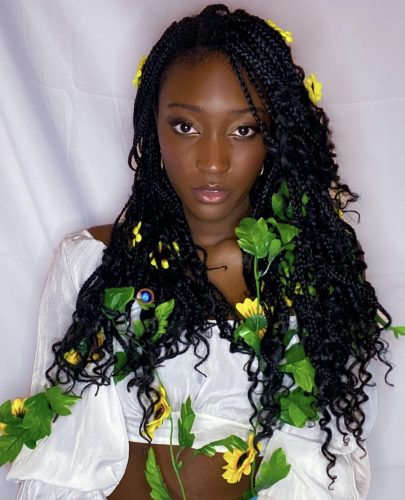
Complaints about “cancel culture” are often the go-to deflection to derail discussions around important issues like cultural appropriation. Jordan loathes cancel culture and is frustrated with what it’s become – namely, an empty and performative gesture centered around shame and punishment as opposed to growth. “Cancel culture I think when it started was meant to hold people accountable. It was meant to say, ‘There’s this person doing a bad thing or there’s this thing that’s bad. We should stop doing it. Cancel it.’ What happened is that it fell into the wrong hands. And so what people started doing instead was taking it to this weird extreme where it’s like, ‘I accidentally misgendered somebody. And I went back and I fixed it, but now I’m canceled.’ And in those moments of not allowing people to grow, it became this tactic for fear. And so people now are like, ‘You can’t cancel my favorite thing. You can’t cancel this. You can’t cancel that.’ Or ‘You’re canceling this. You’re canceling that.’ And in its propensity and its use of being a fear tactic, it lost all of its value. And so now it means nothing. It’s like, ‘You’re canceling syrup.’ And I’m like, ‘No one’s canceling – you can’t cancel syrup for starters.’ But even if you could, in saying this is canceled, it now has no value. All we’re doing instead is drawing attention to it, because we’re talking about canceling it and nothing is happening. We’ve lost its intention of holding people accountable, We should just go back to holding people accountable. We don’t need to say, ‘We’re canceling Tony Lopez.’ Don’t say it. Do it. Because when you say it, nothing happens. We’ll just do it. Stop subscribing, stop watching videos, stop engaging with content and just cancel it. End it. And I think that if we don’t, we will continue to have these conversations about, ‘We’re canceling this or we’re canceling that,’ without actually doing the work of…We get to blow it off. ‘That’s canceled.’ Whether it’s good or bad or neutral or whatever when I say, ‘It’s canceled. It doesn’t matter,’ we’re not learning about why it’s canceled. We’re not learning about how we are perpetuating those systems of harm that made that thing get canceled. We are not holding the people who needed to be canceled accountable. All it is, it’s a catch-all phrase for…either you’re too sensitive or you’re not sensitive enough.” Sadly, most problematic figures with actual power wind up raking in more cash as a result of the uproar. “JK Rowling is still rolling in money, mad transphobic. Do something about it. Stop buying all the Harry Potter merchandise. And it hurts to say it, because that’s really upsetting. Or stop buying stuff until they agree to take a diversity class…learn a thing, do the research, do the growth. And until you do, we’re not engaging with you. Because you refuse to grow, and I refuse to be a part of that. Instead, what happened is we were like, ‘JK Rowling is canceled.’ She wrote a letter with 50 other people who should be thrown to the wayside about how cancel culture is toxic. We set over it like a speed bump and kept it pushing. And nothing happened except JK Rowling got richer off of the scandal. Stop scandalizing and start holding people accountable, because otherwise we’re stuck in a feedback loop and it’s silly.”
Given the draining and continuous labor of unpacking anti-Blackness on an antagonistic platform on top of the seemingly endless reports of police brutality against Black folks dominating recent headlines, Jordan is mindful of routinely stepping back to prioritize self-care in order to preserve her mental health. “I recognize that I exist in the world, and I have a place in the world. But also I can take a break from it. It’s not exclusively who I am,” she reflects. “I do my makeup all the time, partially because it’s TikTok and partially because it’s fun. It brings me peace. It’s the same reason I braid my hair at night. It’s just very soothing for me. I dress up like a fairy and just do something else, because it brings a lot of peace. But I also know that my mental health means more than just taking bubble baths, which I can’t do. I can’t fit in a tub very well, but like taking bubble baths and lighting candles. It’s journaling every day. Do I always want to? No. I’ve missed a couple of days, but I need to process what I’m thinking and feeling in a safe space and that safe space has been my journal. Or going back to therapy and doing the hard work and working through my own traumas as an individual and also my traumas that are given to me by the world as a whole.” She enthusiastically embraces even the smallest things that bring her joy: “I have a very thick collection of Avatar books, like Avatar: The Last Airbender. Love it. Adore it. Favorite show. It is what it is. It’s a mode of escapism for me where I’m like, ‘Hey, I’m really stressed. I’m going to go read about the exact same world that I live in, but in terms of Avatar.’ Because that’s fun for me. That’s a distancing for me. It’s doing the fun stuff. It’s doing the hard work. I can take a nap, and I can come back to it later. I will always be antiracist and pro-Black and unapologetically myself in whatever way that arises. But I also recognize that my existence is an act of rebellion, and it’s hard to rebel all the time. I deserve the nap and I deserve the white chocolate Snickers bar. And I deserve to watch Avatar for the 1800th time between episodes of Ouran Host Club and Miraculous Ladybug.”
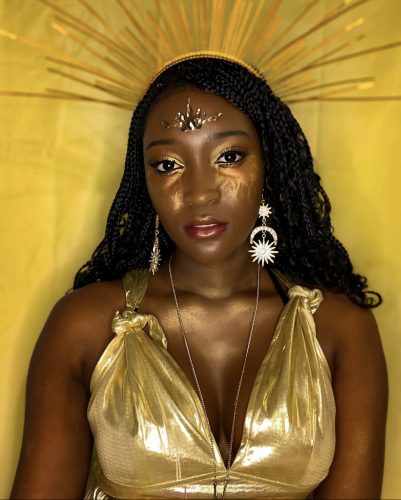
There are things that we can all do to uplift the Black women and girls in our lives. “I think the best thing you can do is hear us and validate us and make spaces safer for us. I know growing up, I felt like I wasn’t Black enough. Because I was told I wasn’t Black enough by Black folk. And I wasn’t white enough, obviously, for white folk. And it made me feel insecure in my Blackness and my existence. It made me feel hard to love. It made me feel like what I loved wasn’t worth loving. I loved Avatar. I’ve always loved Avatar. I love to read. I love to read. I’m really into astronomy. I’m also really into astrology. I was all those things at once, and I felt like they weren’t spaces that I could be in. I wasn’t worthy of those spaces and I wasn’t worthy of the people in those spaces,” Jordan admits. This sense of ostracism deeply impacted her personal life and her perception of her own self-worth. “I ended up in a string of…they weren’t bad relationships. The relationships were fine, but with people who loved me conditionally. And I gave them my all. I was like, ‘This is the person who loves me. Nobody else is going to love me. I have to make it work. I have to make it work.’ And I stayed in relationships consistently longer than I should have. Because I was so desperate to be loved, because I didn’t feel like I was worth loving. I thought we were unworthy of being kidnapped. That is a bonkers ideology to have. And yet there I was with it, because I didn’t feel like I was worthy as a writer, because everybody I read was white. I wasn’t worthy as a woman, because I felt like I was hard to love.” We can break this cycle through simple acts of listening and acknowledgment, particularly when it comes to empowering Black children. “If you make spaces safe, if you validate us when we’re little, we don’t grow up to be big and broken. And so now I’m learning how to heal from stuff. If I had been validated and felt safe and loved younger, I wouldn’t have to heal from this now. And so as a grownup, you can hear us out. You can help love and support us just by being there and uplifting us. When we want to talk about something, don’t silence us. When we say something matters, understand it matters not because we’re nitpicky, but because…if I sat around all day and picked on everything that’s racist, I would never stop talking. When I do decide to talk about something, understand that it’s probably valuable in at least some way and to hear it. Understand that that is valid and valuable and to take it and move accordingly. But when we’re little is when it matters. The people who told me I was a good writer when I was little are why I’m going to grad school today. But without them, I wouldn’t be here. And I think that’s important, because not all little Black girls have those people.”
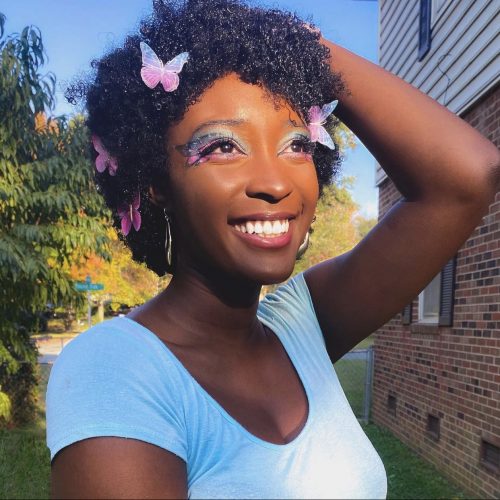
Ultimately, Jordan feels as though we’re in the midst of a transformative cultural moment as a society and remains cautiously optimistic that we might finally be ready to undertake those growing pains as a collective – if only we can be patient with ourselves. “I think that it’s important to not just have these conversations. We’ve been having them for generations, but to really actively engage with them. I think it’s important to not just think like…I think this past summer was a wake up call for a lot of people, which is wild. Because the Black community was sitting around looking at each other like, ‘They got another one. Tragic.’ But for nonblack people, it was seeing it for the first time. And in that moment they experienced the exhaustion, the fatigue and the trauma. And I think it’s important to remember and to recognize and to hold close that this is not just a one-off incident. This happens all the time. There are so many more that we don’t know about, because they weren’t on camera. And to hold that close and to think, ‘I’m tired today, but I can’t stop now.’ Because I like to think of it as a backpack. You can carry your backpack around. Maybe your backpack is 10 pounds, and you carry a backpack everywhere. It’s got your laptop. It’s got your notebook. It’s got everything you need in it, but it’s heavy. It’s okay to put the backpack down, but you can’t abandon it somewhere. It has all your stuff in it. Activism’s like that. You can put the backpack down. People don’t understand either you’re on or you’re off. No. I have days where I sit down with a thing of Oreos and I watch Ouran Host Club, because my brain can’t take another heavy thought. I can’t do it. I get back up tomorrow or the next day or after therapy or whenever, and keep going. People like to either do it for now and then stop. Or they don’t like to do it all, because they know it’s heavy. We need to do it. We can also put the backpack down and pick it up later. It doesn’t have legs. It’s not leaving you. It’s going to sit there, and you can pick it up when you’re done.” The next step involves reimagining our activism to be more substantive. “I think that we need to push past the…for number one, the infographic being peak activism. It’s not. They’re very cute, but it’s not. But also recognizing that we can decide what the future looks like. As nothing matters, nothing is real. We can pick and choose what this looks like for us. And if we really want to have a world where you can wear box braids and you can wear your sari in public and you can do whatever it is that people like to appropriate, we have to push past moments like these to get there, because no one’s saying you can’t wear a sari. The issue is that I can’t wear it in public and therefore, neither can you, the person who made the decision that I can’t wear this in public. You know what I’m saying? Either you can take the selfish route where it’s ‘I want to do what I want to do, I have to push past this,’ or you can take the ‘we’re all in this together and I care about other people’ route. I don’t care which route we take, but you’ve got to push past it to get to whatever the end goal is. And it’s going to be scary. It’s going to be hard. It’s going to take a lot of unlearning and a lot of practice.” Above all, our activism must be unconditional and steadfast. Jordan knows this firsthand: “I misgendered onlyjayus the other day. I felt awful,” she says. “I recorded the whole video over again. I felt terrible, because I didn’t think to check their bio before I filmed. It slipped my mind. Did it suck to take another hour to record a video about somebody who intentionally threw slurs about my community around? Yes. But what that says is, and what that means is that the people like all my nonbinary friends know that I’m still a safe place to go to even if we have beef, even if there are grievances. Because it’s not just about me, it’s about all of us succeeding. Even if it takes extra time, even if it’s extra labor, even if you don’t want to, even if you hate that person, you gotta do it.” What’s at stake is nothing short of our generational future. “We get to decide if we’re going to live like Republicans for another 50 years, or if we’re going to do anything else. Anything else besides that. Take the backpack off if you need to. Take the breath, get some water, sit under the apple tree and discover gravity for all I care, but come back to it when you’re done.” However long the journey takes, we must commit ourselves to bringing everyone along for the ride.
Read more Celebrity Interviews on ClicheMag.com
From Anti-Blackness to Anti-Racism: Deconstructing White Supremacy with Jordan Simone. Photo Credit: Courtesy of Jordan Simone.

